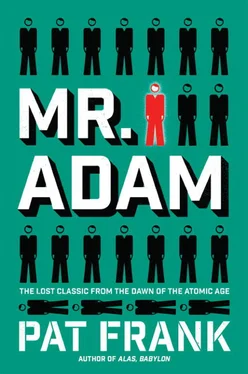Whenever I had asked about possible sterilization from Gamma rays, they’d clam up. Or they had pointed out, in words carefully picked and studied (for they knew they were talking for publication) that radioactive substances emitted Gamma rays “for only a comparatively short time.” Then they’d lapse into the jargon of the physicist, and lead me into a dark scientific jungle where my pedestrian, layman’s learning cast only a dim light.
Now I went to Professor Felix Pell, up at Columbia University. I went to Pell because, of all the surviving atomic physicists, he had talked least about the Mississippi disaster, although I had felt at the time that he could have told most.
Pell is a little man with narrow shoulders and uncertain legs, and you feel his body was constructed simply as a temporary support for his massive head. On his feet he is a caricature of a college professor, but in his own office, his shrunken body hidden behind an immense desk, he is imposing as a Supreme Court Justice posing for his first post-appointment picture.
Pell received me in his office. “I suppose,” he suggested, “that you’re still troubled about that business in Mississippi.”
“Well, not exactly,” I said. “I’m not troubled about Mississippi. Now I’m troubled about the world.”
Professor Pell allowed himself to smile, but I had a feeling—reporters are always getting feelings or they wouldn’t be reporters—that he was not completely at ease.
“It appears,” I said, reaching into my pocket for a cigarette in my attempt to be completely casual, “that the Mississippi explosion sterilized the human race.”
I will say this for Professor Pell. He was emotionally shockproof. “A most peculiar statement,” he said. “I haven’t heard anything about the human race being sterilized.”
“That is because,” I said, “you are not, at this stage in humanity’s development, able to read tomorrow’s newspapers.”
“You are serious?”
“I certainly am. I am sterile, and you are sterile.”
The professor’s head twisted on the thin, wrinkled stem of his neck, and he peered up at me for a period of seconds. Then he dropped his eyes and said: “And what has this alleged sterilization got to do with the Mississippi catastrophe?”
“Since Mississippi blew up, no babies have been conceived anywhere on earth, so far as we can find out.”
“That is hardly scientific proof.”
I suddenly discovered that I hated Professor Pell. Up to this moment I had regarded him with a great deal of respect, and even awe, for was he not one of the superior beings who had, in the President’s words, tapped the source from which the sun draws its power? But of a sudden I hated him, and I knew that I would not be alone in my hate. I put my hands on his desk, and leaned over it until my face was close to his face. “Professor Pell,” I said, “it may not be scientific proof, but it is pretty damn good circumstantial evidence.” I fixed my eyes on his turkey-thin neck. “It is good enough evidence to hang a man,” I continued. “It is good enough evidence to hang any man who even looked sideways at an atom.”
I could see that I had shaken Pell loose from his equanimity. In this moment he was an old man, afraid for his life. “Please sit down,” he said, “and tell me what you want of me, but I would rather not have my name connected with this.”
“You didn’t mind having your name at the top of the list when they were passing out credit for developing the bomb.”
He nodded. “That is true,” he said slowly. “That is perfectly true, and with the credit must go the blame. We have always known that this risk existed, and certainly at every stage in our research and production we took the most careful precautions to safeguard our personnel. But the risk was always there.”
Pell touched a stapled sheaf of papers on the corner of his desk. I could read Top Secret on the first page. “Ever since the Mississippi explosion,” he continued, “we have speculated on the possible harmful effects of unloosing such an unprecedented quantity of radioactive substances—along with obscure rays of which we know little—upon the earth. This is my analysis, which I was about to forward to the National Research Council.”
“And what was your conclusion?” I asked.
“My conclusion,” he said hesitantly, “was that such an explosion would send very penetrating radiations, encompassing the whole spectrum, around the world with the speed of light. Not only Gamma rays, and Alpha and Beta rays and particles, but their obscure variations. It was also my conclusion that these rays would prove harmful, but to what extent it was impossible to predict.”
“Now we know,” I said.
“Yes, indeed,” Pell said, “now we know.” Then he added: “Tell me, were women affected as well as men?”
“Of course the investigations aren’t complete,” I said. “A group of doctors has been making as many examinations as possible. But thus far they’ve found that all men are sterilized without exception, while few if any women were affected. The doctors say almost all women still ovulate, and the Fallopian tubes have not been damaged.”
“The human body,” said Pell, “is a strange business. There are chemistries of the body more mysterious than any problem in physics. Now I asked that question for a good reason. Men have always been more susceptible to certain rays than women. But all known harmful rays have affected both men and women. So the ray which did the damage must be one with which we are not as yet familiar.”
“I don’t see that it matters very much,” I said.
“Well,” said Pell, “it is an interesting aspect of the phenomenon, although its importance henceforth can only be classed as theoretical.”
“Henceforth,” I said, rising, “the importance of everything will only be theoretical.” He was puzzling that one out as I left.
That night we began to move the story across our wires. The reactions, throughout the world, were immediate and fearful. I could trot out all the Hollywood adjectives, and run them into a sentence, two by two, like Noah’s animals entering the Ark, and they would not begin to describe what started happening that night, and kept on happening.
J.C. Pogey, handling the story with no more flurry than if it were a national election, kept me at the rewrite desk until dawn. By that time, the story was not dissimilar to an election, for the whole world was split straight up the middle—those who believed it and those who didn’t.
Strange little sidebar stories began to creep into the main trunk wires.
In Boston, an eminent churchman, hauled from his bed by the local press, denounced the whole thing as a vicious hoax. In Baltimore an equally eminent churchman said he’d been expecting it all along, and added that he wouldn’t be at all surprised if the world didn’t blow up within forty-eight hours.
In London, the King spoke over the BBC, and reassured the Empire that His Majesty’s government was, and had been, well aware of the situation, was conducting an investigation, and was taking the necessary steps.
There were riots in Paris, but there are always riots in Paris.
Moscow cut itself off from the world.
The President urged the nation to be calm.
Up in Morningside Heights, a group of serious young women stoned the apartment house inhabited by Professor Pell.
Spontaneous rumors started simultaneously in Vienna, Budapest, Frankfurt am Main. Madrid and Berne said it was a plot on the part of Jewish scientists.
But it is best, perhaps, to describe what went on in my own particular household.
When I got home, just after the milkman but before the morning papers, Marge was curled up in one corner of Smith Field. I could tell, by the number of cigarette butts, that she had been up all night, undoubtedly listening to the news on the radio. The radio was still on, tuned to a Newark station, and giving out boogie-woogie.
Читать дальше












